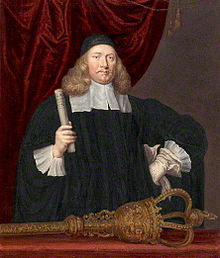
Summary
Sir Edward Turnor or Turnour (1617 – 4 March 1676) of Little Parndon, Essex was a Speaker of the House of Commons of England.[1]
Sir Edward Turnor | |
|---|---|
 | |
| Born | 1617 |
| Died | 4 March 1676 |
Early life edit
Edward Turnor was son of Arthur Turnor of Little Parndon. Passing from John Roysse's Free School in Abingdon (now Abingdon School) in 1632 [2][3] to Queen's College, Oxford. He succeeded his father to the estate at Little Parndon in 1651.
Career edit
He became a barrister, called at Middle Temple, and Member of Parliament in turn for Essex (1654–1661) and Hertford (1661–1671). It was while Turnor sat for Hertford that he served as Speaker of the Commons (1661–1671) and Solicitor General (1670–1671). He was knighted in (1660).[1]
According to Geoffrey Robertson (in his book, The Tyrannicide Brief), a "Sir Edward Turner" (sic) was a "Counsel for the Victim" (the Duke of York) in the 1660 regicide trials.[5] Evidence supporting the argument that Robertson misspelt "Turnour" as "Turner" includes the entry for Sir Edward Turnour provided in "The judges of England, from the time of the Conquest" by Edward Foss.
Turnor was one of the judges appointed under the Fire of London Disputes Act 1666 to deal with property disputes arising as a result of the Great Fire of London.[6]
He died on circuit in Bedford on 4 Mar 1676 and was buried at Little Parndon. He had married twice and left 2 sons and 2 daughters.
His son Edward Turnour was MP for Orford, Suffolk, and married Isobel Keith, daughter of William Keith, 6th Earl Marischal.
See also edit
References edit
- ^ a b TURNOR, Edward (c. 1617–76) of Little Parndon, Essex. historyofparliamentonline.org
- ^ Preston, Arthur Edwin (1929). St.Nicholas Abingdon and Other Papers, pre isbn. Oxford University Press. p. 347.
- ^ Hinde/St John Parker, Thomas/Michael (1977). The Martlet and the Griffen. James and James Publishers Ltd. ISBN 0-907-383-777.
- ^ "Speaker Turner 1661-1671". Baz Manning. Retrieved 2 February 2022.
- ^ G. Robertson, The Tyrannicide Brief, (Vintage, ), 291 and 303
- ^ 'Book 2, Ch. 15: Cheap Ward', A New History of London: Including Westminster and Southwark (1773), pp. 587–593.


